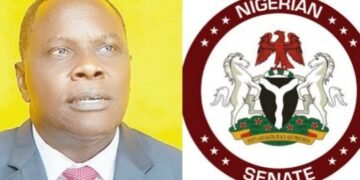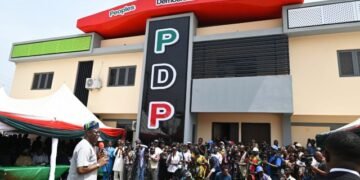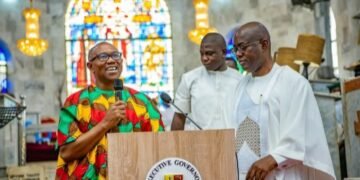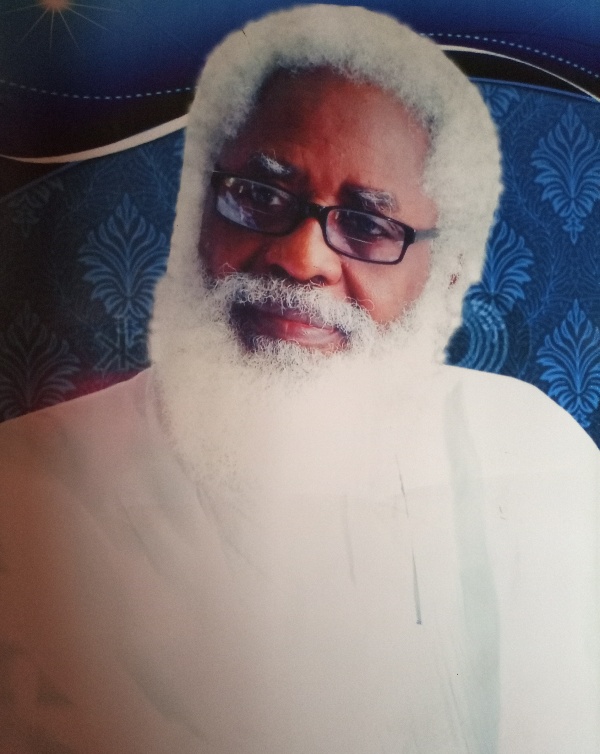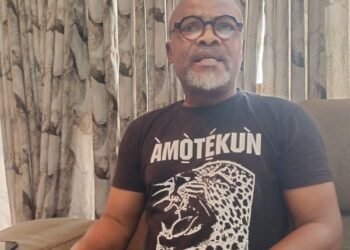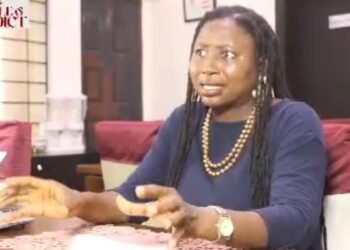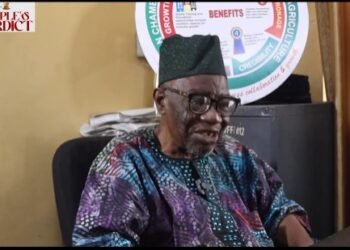Nigeria’s arrested development was caused mainly by the 1983 coup d’etat, led by Major General Muhammadu Buhari, among other factors, declares Ambassador Yemi Farounbi, in this interview to mark his 78th birthday today, 1 October, 2022.
You once claimed that the 1983 elections were rigged. As a major player in the Nigerian political system then and even till now, can you be more emphatic?
Let me explain this: Military President Ibrahim Babangida came up with his “a little bit to the left and a little bit to the right” ideology. In this country, as I speak, the a-little-bit-to-the-left people are more than the a-little-bit-to-the-right. Call them leftists; call them progressives, they are more than the conservatives. You know why?
The left-of-the-centre people are the poorest of the poor; the poor from the middle class downward. So, in any fair election, if you have a representation of the whole decadent men, the conservatives and somebody who is representing genuine change and progressiveness, he would win. That was what played out in 1983.
In 1979, Chief Obafemi Awolowo could not find a running-mate in the North. He had to end with an Igbo as a running-mate; a Yoruba with an Igbo running-mate in a country where the population had already been skewed by the British in favour of the North when it was a none-starter.
But in 1983, the progressive forces in the North found for Awolowo Alhaji Muhammed Kura. By then, there was no state where the Unity Party of Nigeria (UPN) didn’t have a thinking, intellectually sound, resourceful candidate which it couldn’t find in 1979. The people that eventually became the Shehu Yar’Adua Movement, at that time, worked with Awolowo. So, the natural expectation was that Awolowo would win the election. But the rigging was massive.
But the general belief is that he performed better in 1979 than in 1983…
That was the result. But he was much more better in 1983 because he now had these radicals in the North; and, as I said, those who are now called the Shehu Yar’Adua Group were all behind him. But he lost and it became obvious to the natural winners that the way things were going, they would lose control or probably the political leadership of the country. So, they called on their military wing to take the crown. And so, we went on into 16 years of rulership by that military wing. It is the reality.
And, until very lately, the left-of-centre people, even in the US, they are called the Democrats. Most times, they are not united. You should go and study the American presidential system. You will find that, for many years, the Democrats will control the House of Congress and Senate, but they will not win president.
This is because they will not be able to agree among themselves- little to the left, centre to the left, extreme left- on a candidate that can unite all of them. Whereas, the Conservatives never had that problem. That is why for a long time before Jimmy Carter came, there was no Democratic president. And after Jimmy Carter, and until Bill Clinton came, there was none because they will fractionalize; they will so struggle during the primaries that they will be exhausted at the end of it. They will fight the primary as if it is the end of the world. The middle-of-the-left will want to over-power the outside-left; the outside-left will want to over-power the inside-left.
The same thing in Labour Party in the UK. That is why, until when Tony Blair came, they spent years in wilderness. And after Tony Blair left- he handed over to James Gordon Brown- they are now back in the wilderness; either David Cameron or Theresa May or Boris Johnson. This is the third Conservative Prime Minister because it is so difficult for the left-of-the-centre to subdue their pride, their divisions, their fractionalization and unite.
Where did you put the Nigerian situation in that calculation?
In Nigeria, we have those who masquerade as the left-of-the-centre but who, indeed, are not. This is because I knew this, working with the UPN. I knew a lot of candidates who won elections on the platform of the party. They were on that platform because that was the only platform that would win, not because they believe in what the UPN stood for. They only wanted a platform to win.
That is what happens in Nigeria now. People only look for platforms to win; not because they agreed with whatever that platform stands for. So, if you ask them during the UPN days, what is rural integrated development, they don’t know. Free education, the same thing. When you start thinking of rural integration or gainful employment or Optimum Community (OPTICOM), they don’t understand.
You couldn’t have been contesting on the platform of a party that you don’t understand what it stood for. But they did because it was the only party that could win an election in the West. So, we still have people who masquerade as leftists but who had no understanding of what it takes to have a left-of-the-entre party and they say they are a progressive party.
Then, you ask them, “what is progressive in it?” They will tell you that they are natural inheritors of Awolowo. Is it because of their cap or you wear his glasses? Have you studied Awolowo himself?
When Awolowo was doing Action Group (AG), he didn’t go out to build a national party. He built a party for the West and built alliances, either with the UMBC or Dynamic Party or a party in the South-East or Ibrahim Imam’s party.
But when he formed the UPN, he decided he was going to have a nationally-oriented and directed party. And his cardinal points were different from his when he was ordering Yoruba. Yoruba was a welfarist AG- life more abundance.
Awolowo now looked at Nigeria and thought of equalizing wealth. Therefore, I must have free education, I must have free health, I must have rural integrated development, that is, turning rural areas into suburbans. He tried to experiment it in Aawe, with Professor Akin Mabogunje and Professor Ojetunji Aboyade.
You use the school as the centre of the town and you make sure that the school is so well developed; that it must have the same facilities as we have in the urban centre so that there will be no need for you to have a drift of your children from the rural school to the urban school.

You are also going to have farms. You don’t expect these farmers to work with cutlasses and hoes. You are thinking of caterpillars and tractors; you are thinking of buying them rain boots and stuffs like that. You are beginning to think of the concept of farm settlement which was an Israeli idea.
You live in a farm; not the kind of what their fathers used to live in, but comfortable places where they have electricity. So, if you want to watch television, you can watch it. If it were like today that you have GSM, you should be able to use GSM. So, you will not have the urge to want to leave. Awolowo called it OPTICOM. But these people didn’t understand. He thought that, if you are able to do all of these, then Nigeria will rapidly grow. And it would have grown.
Invariably, are you saying the 1983 coup successful thwarted the developmental strides of the West?
Yes, both of the West and those who sympathised with him and became the Progressive Party Alliance (PPA). If you remember, all of them got clamped into jails; all of them got 165, 300 years jail terms; all of them were put in prisons; some of them, Aper Aku of Benue, Bisi Onabanjo of Ogun, Ambrose Alli of Bendel, lost their health and died in the process. Even the vice president was put in prison and the president was put under arrest in a Guest House.
So, it was, in my view, an arrest of a possible growth and development of the whole country. Of course, it affected the West more because we are like an engine room. And that was the beauty of the Federalism we had before. There was competitive federalism; we were all interested in production. We were not operating a distributive federalism. Today, we are just distributing.
Then, we were contributing. If the West was building a Cocoa House, the East was thinking of a Palmoil House; Mid-West was thinking of a Rubber House; the North will be thinking of a Groundnut House. If the West, in 1954, started the minimum wage, everybody caught up with it.
If the West, in 1955, started the Pilgrims’ Welfare Board- it was the first to take care of its pilgrims in Saudi Arabia- everybody caught to it. If the West started free education, the East attempted it. If the West built a stadium, the others did. The East built a University of Nigeria, the others copied it. If the West built a television service, the others copied it.
You know, there was competitive and healthy rivalry that led to a forward movement. All of that was arrested with the 1983 coup.
You have been part of the system all through the years. What did you do to bring all these to the knowledge of those in the corridors of power?
That is a very interesting question. I had the privilege of working with Chief Bola Ige, one of the most restless brains I have ever worked with and who enjoyed good argument. That reflected in his governance.
He wanted to do a television station and he told me: “My Leader started the first television in Africa. I want to build the best in Africa. That is your assignment. Go ahead. You are the only one who can do it for me.” I said: “that is turning me to God”.
I have told you that Bola Ige enjoyed arguments. When you argue with him and you give him good reasons why he must not do what he wanted to do, he will agree. I found that, interestingly, also in Chief Awolowo. Some people tell me all kinds of stories until I met the man.
I cannot remember exactly but I told him something and he looked at me and said, “Where did you get that idea from?” I said I read it from a book. He said: “That is strange. That is a good idea. Can I have the book?” I went and bought a copy for him. Baba insisted on returning my Two Shillings.
But there are people that you cannot talk to; they cannot understand. But that is democracy. Democracy is not necessarily the best form of government. It does not necessarily guarantee that you will elect the best.
And in the circumstances of Nigeria, from 1993 or thereabout, it is who has the biggest account in the bank that they voted for. So, when you interacted with some of them like that, they have lots of money, as Dr Kingsley Ozumba Mbadiwe will say, “of sources known and unknown”, “legitimate and illegitimate”. So, they win, but it becomes difficult to reach them intellectually.
But there are those we talk to, in my own way. For example, we were placing full page adverts on things that we believe in. We would first have written the Head of State or whoever by courier. Then we wait for sometime; then we place it as adverts in the Punch, Tribune and, very occasionally, the Guardian. But my own easiest of talking is that I am friend of the media. I am a part of the media and I am a friend of the media.
The expectation was that former President Olusegun Obasanjo would make you a minister. Why was it not so?
Obasanjo is a man that loves Nigeria totally and completely. And I can say it, I have not met another person who loves Nigeria like him. But also, he has only one human weakness: the first person that reports a case to him is the righteous. He hasn’t the patience of listening to the other side. But in our own job, we have toured the art of balance, objectivity, impartiality and so on.
When he was military Head of State, he loved my station all years. In fact, there were instance that is was only NTV Ibadan that will be there covering his assignments because he loves our objectivity; he likes best our aggressiveness.
When he had a famous Jaji speech, we were the only station there and he was shocked that there was not even one other reporter there, not even from the Print. He asked, “where are you people from?” I said we were from NTV Ibadan. He offered to take my reporter in his presidential jet to Lagos. The reporter told me he came by road and that is he going back by road. He knows his GM is waiting to use the report for the 7’o’ clock news. So, he brought my reporter to Lagos. He gave him vehicle to bring him to Ibadan and I used the report. When anybody go to Lagos in respect of the report, he said, “go to Ibadan to get the script”. He had confidence in what we were doing.
At what point did you disagree with him?
I really don’t know; I didn’t disagree with him. I think he just thought that I am a rebel and now that he had worked hard and had become the president and they decided that it is only those who competed to be governors would become ministers, except in Osun State where Dr Olu Alabi was made chairman of the Federal Capital Territory. We had insisted that Chief S. M. Afolabi should be the minister. In fact, I was the one who made his nomination. But they didn’t even consider me for anything.
You see, I got into politics fortuitously; I got into politics because Bola Ige wanted an excellent television station. There is no way I can give an excellent television station without interfacing with the politicians, the finance commissioner and all of that.
And when we started the job, I knew he had to have a second term for me to complete the assignment. So, I had to assist as a participant observer in ensuring that he could get a second term so that we can complete this dream of a Mecca of television Africa.
In trying to do that, I was interested in Bola Ige winning the election. That was how I got into politics. I was a completely a professional who finds himself surrounded by politicians. But I got respected by my boss.
When we now had military interregnums, and a lot of people approached Papa Awolowo and all his lieutnants were in jail. We were the only few ones available. papa will not attend such meetings. He will nominate some of us and say “Yemi, four five people, go and represent me.” In that process, I got exposed to a lot of politicians across Nigeria.
But everybody knew me the way I am and I say things the way I understand them. Sometimes, I look at myself like the Yoruba. I didn’t understand politics enough; Yoruba also didn’t understand politics enough.
So, those who thought I probably would have become a threat sold some ideas in the corridors that created disenchantment with me. But eventually, because Obasanjo is basically intelligent- forget books, forget PhD- he has it, natural. Of course, he is also bossy like all military officers- they want to dominate their environment. But when you say the unusual, Obasanjo takes a look at you.
One day, I got to a meeting and I said the unusual and everybody disagreed with me, Obasanjo said “shut up. We will leave it the way Yemi said. We would talk about it later”. When we were going out, he called me, “that thing you said, is it right?” I said “it is the truth. Don’t talk about right or wrong. It is the truth.” He said “okay, can you bring the person to me?”. I said ‘yes’ and I did and he found that it was the truth. But by then, he had left office. He said, “I wish I had known you better.” That was how I became an ambassador.
Nigeria is 62 years old today as an independent country. Coincidentally, you share same birthday with the geographical entity called Nigeria…
No, Nigeria shares birthday with me. I am the original owner…
Okay. How do you feel with the country sharing birthday with you?
In 1960, I was very proud. As a student of Christ School, Ado-Ekiti, I was on top of the world- the only student having the honour of having his country sharing birthday with him. That day, they gave us jollof rice and Mirinda and I looked to a great country.
In 1960, we were ahead if Singapore; we were ahead of Thailand; we were ahead of Malaysia; we were ahead of Indonesia; wet ahead of Egypt; we were ahead of Tunisia. We were ahead of all of them. Today, we are struggling to be the Poverty Capital of the World.
In 1960, our Prime Minister was called the Golden Voice of Africa. Now people are struggling to understand what our president is saying.
In 1960, you finished from any university in Nigeria, you are sure of post-graduate studies straight away. Nobody will ask you to do a Test of English for Foreign Students or a GRE because they knew you are rock solid. Of course, the university had universality in it; had foreign teachers; had foreign students.
In fact, we were so rascally that we went to spend our vacation, doing holiday jobs in London. N384 was the cost of ticket. When they negotiate it, it would be about N200 for students. So, we had everything to be the masterpiece in Africa. Why won’t I be proud?
Then, by 1962, what started happening in the West started happening. By 1964, there was a massive stroke by the Joint Action Committee of the Imoudu/Adebola and co. For three months, they were on the strike. That was when I started losing faith in Nigeria. That was when I started wearing this beard- no, this cannot be the Nigeria of my dream. Three-month strike? It cannot be. Fight in the Parliament? Fire on the mountain, arresting popular politicians? Doing stupid Coker Enquiry? Taking advantage of the Western Nigerian situation to create a Mid-West, while refusing to create regions for the other minorities of the Calabar/Ogoja Rivers and the Middle Belt, as recommended by the Willink Minority Commission of 1957? Trying to take over the National Bank because it belongs to the West, but for the Supreme Court?
Of course, we are Marxists and that was the popular thing- Tunji Otegbeye, Mokwugo Okoye, Wole Soyinka and another one radical. I said when Nigeria becomes good, then I will shave the beard.
Another time, you will remember, Victor Olaiya cane with a song in 1964, Ilu Le O, Ko Sowo Lode, even though we were enjoying. At least, First Class then was still N600. In fact, we were not in Naira then- we were still in British West Africa Pounds. Then, you take your passport and travel and you get to the airport there to get your entry visa- unlike now that you have to wake up by 4am to queue in one embassy. This is not the Nigeria of our dreams.
The constitutions that we used from 1914 to 1960 were produced by the colonial power. After 1963, all the constitutions that we had were donated by the military. We are practicing today a presidential system that we never negotiated; that we never agreed to have.
In the 1977-78 Confab, General Murtala Mohammed said presidential system is a no-go area; you cannot discuss it. We never agree to abandon the parliamentary system; we were coerced into it. And unfortunately, since 1977, we are still in it. We don’t have an economy that can support it. We don’t have the temperament for the presidential system.
In your speech, “Nigeria As I See It”, at a recent event, you encapsulated a man who is tired of the whole system…
I don’t know any Nigerian that is honest that is not tired of this system. Is it that your pocket today keeps on depreciating? Is it that eight years ago, you can buy a bag of rice for N7,500 and today, you cannot buy it for N35,000? Is it that eight years ago, you can still buy a dollar for N165, but now you are looking for N720? The same dollar that was 68kobo? N1,000 bought £963. Now, N1,000 can almost not buy a pound. So, everybody is frustrated and what is the cause?
I look at Nigeria as a computer. It has hardware; it has software; it has operator. Nigeria has hardware, the structure. The hardware is wrong. The structure kills initiative. We talked about the competitive regions. Who is competing now? Everybody is running to Abuja. The governors are more in Abuja than in their states. It was not like that, even in 1979. The governors never had the opportunity of meeting Shehu Shagari, as president in a year; may be once.
Now, the governors are regularly meeting in Abuja; they are always there for little things. Water resources, you have to go to federal. Education, you have to go to federal. Roads, health and others too. So what is the federating unit doing? Is that our understanding of Federalism?
The man who created the concept, K. C. Wares, said federalism is a coordinating relationship between the centre and the federating units; not a subordinate relationship; not a principal and class teacher relationship. Sometimes, the governor will just be leaving Abuja and he will be called to come back because he has to see a minister. And sometimes, he has to wait for days to see a minister. What is his business?
So, we have structural problems with our computer. And people are refusing to let us change the computer. So, no matter what you do, that computer will give you false answers.
Then, you have poor system. Our system has viruses. We run a presidential system. There was once a state in the South-South that had 109 special assistants to the governor.
Must the Legislature be full-time? How many laws are they making? They are passing resolutions. Yes, but sometimes passing resolutions that cannot be implemented so much so that the Speaker of the House of Representatives had to begged them, “start passing this resolution on new universities”. The government can’t even pay the salaries of the existing ones.
Now you are passing the resolutions everyday because you have to report to your constituency. That is part of the indiscipline in the system. But the critical things are the ones they will not touch.
Since 1999, Obasanjo conceived the concept of amending the Constitution. And rightly, he approached it the way it was approached in 1963. He called the political parties: “All of you, form a committee. This is the 1999 Constitution. I didn’t see it before I was sworn in. I saw it only after I have been sworn in. Look at it to see what we can do,” he said.
They went round; they did whatever they could. Then, they set up a committee under Professor Jerry Gana. They went round the whole country to see how this constitution could be put together.
Then, Obasanjo put up a Confab. It was a laborious effort. It was like what the British did before they brought in the 1951 Constitution where they went to almost all the villages. I was the technical adviser to the western delegates and we worked very hard.
That experience taught me two things: First was that the Lagos delegation said they will not meet with the other south-western delegation because “gedegbe l’Eko wa”. So, sometimes when I hear all these agitations that I hear in the air, I always ask, “has the Lagos people told you that they are with you?” Then, the people from my mother’s place, Ekiti, said they will never come back to Ibadan.
And I remembered that Chief Ajibola Ogunsola, who the chairman of the Punch, a brilliant man, commissioned a survey which showed that in the South-West and the South-East, they don’t want to come back to Ibadan and they don’t want to go back to Enugu. In fact, in Imo State, it was worse; they said they will never go back to Enugu.
They did a good job. Then somebody went and smuggled in a Third Term Clause. Otherwise, this 1999 Constitution could have been a forgotten history by now. A new one had been written but somebody included a third term.
Who did you suspect could that somebody be?
It must be a government agent…

But some people are pointing fingers at Obasanjo…
He couldn’t have put it himself because he was not a part of the Confab. He might have engineered it, but he said he didn’t and I know that he is a very courageous person; he is very bold. Even if you will kill him, he will tell you the truth. So, I have a tendency to believe him.
But what I have learnt in Nigerian politics is that there are too many sycophants who would look at your face and imagine what your mouth wants to say and they say it before you say it.
Because of that clause, and I think Nigeria and God has a siamese relationship. His loves Nigeria too much, otherwise we should have forgotten about this country by now. In fact, President Ibrahim Babangida once said he doesn’t know how this country is still surviving; he doesn’t understand how the economy is running on its own.
They got to the House [National Assembly] and Senator Ken Nnamani said they should vote on the motion that should the new constitution be accepted or rejected, because of only one clause…
But they could have removed the controversial clause…
That is the most intelligent thing that the chairman of the National Assembly ought to have done. But this is a country where the leaders are ruled by the mob; they are unable to control the mob. The whole efforts on the Confab; efforts of the political parties- then they were three- and efforts of Jerry Hana and his team (I know he is a master when it comes to oratory) we lost it.
Since then, what are we able to amend? Things that affect the lives of the members, usually the Electoral Act. But they even shot themselves in the feet. In trying to create conveniences for themselves, they forgot many clauses that prevented many of them from participating in their congresses as well. Ordinary state police, we have been unable to address it. Those are the viruses in our computer.
Now, we are looking for operator. We have had all kinds of operators. We have had Obasanjo. I have no doubt in my mind that he is well-intentioned but he missed it; he missed a few opportunities. I still believe that he has contributed a lot but he could have contributed more than that. Obasanjo, in my view, could have been the Lee Kuan Yew of Nigeria. He has the capacity; he had the courage; he had the boldness, but somehow, he did a lot but he lost it.
There came former President Umaru Musa Yar’ adua that people celebrated because he reduced the price of oil, but created complications. There were 17 Independent Power projects that Obasanjo was doing. Yar’adua suspended them. They are there till today, undone. The equipment are there at the ports, abandoned.
Yar’ adua cancelled the railway lines that the Chinese had started, only for Buhari to start, eight years after. You know where would have been?
I will never forget: Obasanjo rightly said these refineries, the government has no business with them; sell them. And Dangote bought all the four. Yar’adua came; he reverted the decision. He paid Dangote back and took over the refineries. Where are they today? We are now waiting for a refinery that Dangite is building. And he is building it in an Export Promotion Zone. So, when you bring in petroleum from there, it is an import. You pay the same price as you are bringing in the product from wherever in the world.
These are some major decisions that were disrupted. Obasanjo has gotten us into what we called the NEEDS Economic Policy then. You abandoned it. The concept of SERVICOM, which was training the civil servants to be civil for a change and they had in every offices SERVICOM, a monitor of behaviour and character, of interaction with the public. He cancelled all of that. Policy summersault.
Unfortunately, Yar’ adua died and Goodluck Jonathan came in. Of course, I cannot blame him; he never thought he will be president, but he became president. But my own unhappiness is that he was educated enough that after an initial shock of becoming president, he would be able to assemble an intelligentsia that would have been able to take Nigeria to a higher level. Of course, the Ijaws saw it as awon lokan.
I know that this government is still implementing most of his plans- transportation, waterways system, and even power. That is good; continuity is a very good thing. But Jonathan, in my view, made a goof.
He set up a National Conference. The conference came up with, unanimous, 600 resolutions. There was no debate; all of them; in spite of the diversity of Nigeria, they all agreed on the resolutions. Eventually, the Secretariat, led by Professor Bolaji Akinyemi, separates the resolutions into Legislative Action and the Executive Action- about 150 or thereabout- that just needed an Executive Order. Jonathan refused to do it; he kept it there.
Probably he did that thinking that he would signed if he wins a second term of office…
In fact, it is on record that Professor Akinyemi told him, “only God knows who will be there after this (2015) elections. Do your own bit.” He didn’t sign it. He wasted efforts; he wasted energy; he wasted resources.
Now when you have a faulty structure and a virus-ladden system, it doesn’t matter who the operator is; gabbage in, gabbage out. The system of a true federalism is that, if all the powers are devolved, if instead of aggregating 53 per cent of the money in Abuja, you put what even the National Conference recommended, 40 per cent and you bring the rest to the states, even if somebody is misusing the 40 per cent, we would be sure that the rest 60 per cent would be judiciously used.
But when somebody is misusing 53 per cent, our life is gone. And that is why I looked at Nigeria now and I feel so disillusioned because I don’t see the efforts at correcting the problems.
In my interview with you last April, you said there is going to be a thundering change. You were so optimistic. What could have changed?
I am disillusioned with Nigeria. But now let me say the other side of it. Sometimes, when I talk to you, I am talking as the journalist that you know. Again, when I am talking as the minister of God that I am, note it. I told some of your good colleagues- Dapo Ajanaku, Yusuf Olaniyonu, Mayor Akinpelu and Seye Kehinde- that Sani Abacha will die and that nothing can stop it. A friend of mine was with me. He said “won a kan gbe e ni o” (“they will just arrest you”). That he will not die. sebi we saw him on the television he was receiving the PLO President, Yasser Arafat”. But I told him that that was a dead man that I saw.
Before we finished where we were eating suya, we got a phone call that we should go and watch the CNN; it seems like something is happening in Abuja. We rushed there and that was how the meeting ended. The journalists all rushed to their various offices. That my friend and I took a plane. We went to Abuja. From Abuja, we went to Kano because we want to see the dead body. We were there when he was being buried.
So, there are times the reality on ground is frustrating. But the reality with his is that there is going to be a change, whether we like it or not. I have looked at it and I think we are dangerously near the change because when people refused to do what they do, and you expect that those who should benefit from what they should do but refused to do would keep quiet, they will. But they will reach a point, as the Yoruba will say, when the goat gets to the wall, it turns round and it bites, though it doesn’t have teeth.
When this come comes to become, there is going to be a change. The fear of such change is that, it happened in France, they lost control. It happened in the Arab Springs, they lost control; Libya has not gotten out of it; Egypt managed it and Tunisia also managed it.
We are not a country that thinks ahead. If we have been thinking ahead, nobody would have been talking of IPOB or Yoruba Nation. If you have allowed the six zones- they are not legitimate in Law; they are not anywhere in the Constitution- but it was created by the Constitutional Conference of Abacha. The concept of six zones; that is one of his contributions to history. If you devolve powers and money to the zones, they will query their governor or whoever is the head of the region. They will not be bothering Abuja.
My other worry; now take the West. The West on its own, all the governors, motivated by some young people, created the Development Agenda for Western Nigeria (DAWN). The natural expectation was that each government in the region would contribute a percentage of its budget to DAWN for the development of the zone.
In 2002, I held a meeting with O’dua, as headed by Sir Remi Omotoso. We agreed that the West can have a light rail of its own. We don’t need 50 coaches; five to 10 coaches will be doing Ibadan, Ilesa, Akure, Osogbo, Abeokuta. That will take off the loads on the roads and people will stop dying. O’dua felt excited that they found a Canadian partner. The Federal Goverment didn’t allow them then because all the power on railway belongs to the government at the centre.
But now that they have relaxed the powers, why are we not doing it, just like Lagos is doing one? Why is it, for example, all of them together, cannot contribute money to do a refinery? A small one in Ondo State producing 50,000 barrels per day? Another one in Ogun? After all, we have been told that the South-West consumes about 60 to 70 per cent of the petrol. So,why must we rely on others?
Happily we have crude oil in Ondo; we have in Ogun and we have in coastal Lagos. So, we don’t have necessarily to rely on other people. Why are we not doing that?
Why are we not generating our own power? Because even under the existing law, you can generate 10megawatts without asking for a license.
Why are we not putting up our rural areas under solar? Nigeria has the highest capacity for solar; we can retain 87.75 of solar energy. So, why are we not doing it in Oke Ogun and in all the rural areas?
Why are we not producing power from the Asejire Dam? The oyan Dam was created to have power to generate electricity. Why are we not doing that? We are still the one consuming 60 per cent of electricity in this country; we are the only one paying for electricity. So, why can’t we forget about restructuring yet? Why can’t we put our resources together and generate own electricity?
Now the northern governors met. They have agreed to see how they can generate 20,000megawatts of solar. What is stopping us? It is not restructuring; it is a will. When the UPN was there, even Kwara, they will give them appointments because the treated them as Yoruba; Kogi, they treated them as part of themselves.
If the South-West had started doing that, I am sure that the South-East would have followed suit. Other zones would have copied it. Without asking questions, Nigeria would have restructured itself.
2023 elections are around the corner and some are saying emi lokan; some are saying ola awon omo wa lokan. What do you see beyond the rhetoric?
I said it somewhere (where you were present) that a contractor built a house for me. The house collapsed because of his inefficiency and ineptitude. I want to rebuild the house, the contractor puts his chest forward and he said he will rebuild it for me. Should I give it to him? That is the problem with Nigeria.
I also said Bill Clinton said you do the same thing the same way, over and over and you are expecting different result. You are a lunatic.
I also said Oliver Cromwell said “you people have sat there for too long for anything you are doing. In the name of God, go.”
I also quoted one character called Geoffrey St Clair in Joy Fielding’s novel, TRANCE. He said “We are tired of all the sloth masquerading as progress. We are tired of all the imbecilic chatter about freedom and democracy like so many school children.”
The problem of Nigeria, I can use myself to illustrate it. I became a GM at 33. I am still talking at 78. Obasanjo became the Federal Commissioner of Works at 37. Somebody says Nigeria is his PLC.
Even our children that we are talking about, where are they? Are they being trained in the right way? Are they being given the opportunity? Have they gone through the processes you have gone? Would they know the concepts of hard work, industry, self-discipline?
Somebody told me that lady from Nigeria who is a now a minister in the UK was one of those who wanted to become the Prime Minister at 37. I asked him, do you know she had been? Have allowed the youths to be there? She has been councillor; she had been honourable member.
Look at the oddity. Britain has a population of 55 million. They wanted to elect a new Prime Minister. All the members of the Conservative Party voted; they were 172,000. How many people voted for Alhaji Atiku Abubakar? Delegates under 900 to represent 205 million Nigerians. Is that statistically representatives? Senator Bola Tinubu had 2,200 delegates. Compared it with 172,000 of Conservatives representatives of another country. We are not getting it right.
So, what do I expect? They will make all this noise. I pray that we able to do the elections. I have reasons not to believe so. The Federal Goverment admitted that the massacre in Owo was done by ISWAP. And ISWAP boldly issued a statement and admitted that they were then once who attacked police vehicles in Ondo State. It is no longer Borno or You’ve states. This is Ondo State.
So where is safe for elections? In 2015, we postponed elections for few weeks to allow the mercenaries to help us clear the Boko Haram insurgents from four local government areas in Borno. What are we going to do now?
How are they going to do elections in the South-East if IPOB decides that on election day, nobody must go out? You see the problems they are giving the governor of Anambra State now, Professor Chukwuma Soludo.
We have not been sincere with ourselves and, unfortunately, those who are campaigning- very nice, beautiful ones, good experience, fantastic governors, fantastic former vice president and all of that- but nobody is analysing the problems facing us. Nobody is telling us the solution.
I listened to somebody. He said “to solve the problem of the strike by the Academic Staff Union of Universities (ASUU), I will take the crude oil for one day and use it to pay them.” He forgot that the Constitution says that the money from crude oil belongs to the federal, state and local governments. That is my president. Or vice presidential candidate who said we need a president like Abacha. We know how many hours you journalists suffered.
So, we are not getting it right. And if we continue this way, something tells me that that the staggering explosion may not just be my dream, but a reality to expect.

